The European Union will review 2018 yellowfin tuna catches in the Seychelles by its members as part of an investigation into claims Spain may have overshot its quota for the year.
The review will include a comparison of figures of the total 2018 yellowfin tuna catch in the Seychelles by Spain with those of Indian Ocean Tuna Commission (IOTC) member-states’ scientific agencies before confirming or refuting the overfishing claim, according to E.U. Ambassador to Seychelles Vincent Degert, speaking with the Seychelles News Agency.
An October 2019 meeting in Spain of the IOTC Working Party on Tropical Tuna last October failed to reach a consensus on the correct yellowfin tuna catch figures by Spain.
According to Nirmal Shah, the CEO of environmental non-governmental organization Nature Seychelles, the E.U. reported to the IOTC that Spain caught 45,318 metric tons (MT) of yellowfin tuna in the Seychelles in 2018, which varies with the 44,964 MT figure published in the E.U.’s official journal.
“This discrepancy pales in comparison to the third catch total for Spain in 2018,” Shah said.
Should the investigation prove Spain overshot its 2018 yellowfin tuna catch quota, the excess tonnage will be reduced from its future allocation, Degert said.
These claims of overfishing by Spain in the waters of the Seychelles, an island country in the Indian Ocean, come barely two months after the E.U. and the Seychelles concluded talks on a new sustainable fisheries partnership agreement.
The partnership entails allowing 40 tuna purse-seiners and eight long liners from E.U. members to fish in Seychelles for six years in return for E.U.’s financial contribution of EUR 5.3 million (USD 5.9 million) annually, of which EUR 2.8 million (USD 3.1 million) will be channeled into to efforts in support of sustainable fisheries management and small-scale fishers.
“The new agreement is based on the principles of the common fisheries policy such as transparency, governance of fishing activities, non-discrimination, respect of the scientific advice and scientific cooperation on data collection and analysis,” the E.U. said in a statement.
Photo courtesy of Adrijana Stevanovski/Shutterstock







